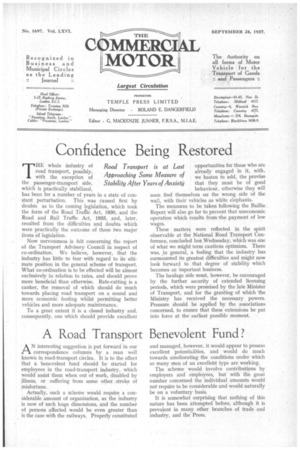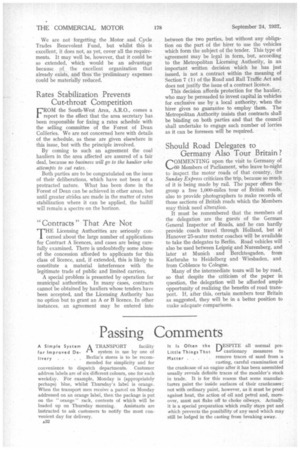A Road Transport Benevolent Fund?
Page 33

Page 34

If you've noticed an error in this article please click here to report it so we can fix it.
AN interesting suggestion is put forward in our correspondence columns by a man well known in road-transport circles. It is to the effect that a benevolent fund should be started for employees in the road-transport industry, which would assist them when out of work, disabled by illness, or suffering from some other stroke of misfortune.
Actually, such a scheme would require a considerable amount of organization, as the industry is now of such huge dimensions, and the number of persons affected would be even greater than is the case with the railways. Properly constituted and managed, however, it would appear to possess excellent potentialities, and would do much towards ameliorating the conditions under which so many men of an excelleht type are working.
The scheme would involve contributions by employers and employees, but with the great number concerned the individual amounts would not require to be considerable and would naturally be on a voluntary basis.
It is somewhat surprising that nothing of this nature has been attempted before, although it is prevalent in many other branches of trade and industry, and the Press. We are not forgetting the Motor and Cycle Trades Benevolent Fund, but whilst this is excellent, it does not, as yet, cover all the requirements. It may well be, however, that it could be so extended, which would be an advantage because of the excellent organization that already exists, and thus the preliminary expenses could be materially reduced.
Rates Stabilization Prevents Cut-throat Competition CROM the South-West Area, A.R.O., comes a report to the effect that the area secretary has been responsible for fixing a rates schedule with the selling committee of the Forest of Dean Collieries. We are not concerned here with details of the schedule, as these are given elsewhere in this issue, but with the principle involved. By coming to such an agreement the coal hauliers in the area affected are assured of a fair deal, because no business will go to the haulier who attempts to cut rates. Both parties are to be congratulated on the issue of their deliberations, which have not been of a protracted nature. What has been done in the Forest of Dean can be achieved in other areas, but until greater strides are made in the matter of rates stabilization where it can be applied, the bailiff will remain a spectre on the horizon.
" Contracts " That Are Not THE Licensing Authorities are seriously concerned about the large number of applications for Contract A licences, and cases are being carefully examined. There is undoubtedly some abuse of the concession afforded to applicants for this class of licence, and, if extended, this is likely to constitute a material interference with the legitimate trade of public and limited carriers. A special problem is presented by operation for municipal authorities. In many cases, contracts cannot be obtained by hauliers whose tenders have been accepted, and the Licensing Authority has no option but to grant an A or B licence. In other instances, an agreement may be entered into between the two parties, but without any obligation on the part of the hirer to use the vehicles which form the subject of the tender. This type of agreement may be legal in form, but, according to the Metropolitan Licensing Authority, in an important written decision which he has just issued, is not a contract within the meaning of Section 7 (1) of the Road and Rail Traffic Act and does not justify the issue of a contract licence. This decision affords protection for the haulier, who may be persuaded to invest capital in vehicles for exclusive use by a local authority, when the hirer gives no guarantee to employ them. The Metropolitan Authority insists that contracts shall be binding on both parties and that the council shall undertake to engage such number of lorries as it can be foreseen will be required.
Should Road Delegates to Germany Also Tour Britain ? COMMENTING upon the visit to Germany of e.)0 Members of Parliament, who leave to-night to inspect the motor roads of that country, the Sunday Express criticizes the trip, because so much of it is being made by rail. The paper offers the group a free 1,000-miles tour of British roads, also to provide photographers to make records of those sections of British roads which the Members may think need alteration. It must be remembered that the members of the delegation are the guests of the German General Inspector of Roads, and he can hardly provide coach travel through Holland, but at Hanover 25-seater motor coaches will be available to take the delegates to Berlin. Road vehicles will also be used between Leipzig and Nuremberg, and later at Munich and Berchtesgaden, from Karlsruhe to Heidelberg and Wiesbaden, and from Coblence to Cologne. Many of the intermediate tours will be by road, so that despite the criticism of the paper in question, the delegation will be afforded ample opportunity of realizing the benefits of road transport. If, after this, certain members tour Britain as suggested, they will be in a better position to make adequate comparisons.




























































































